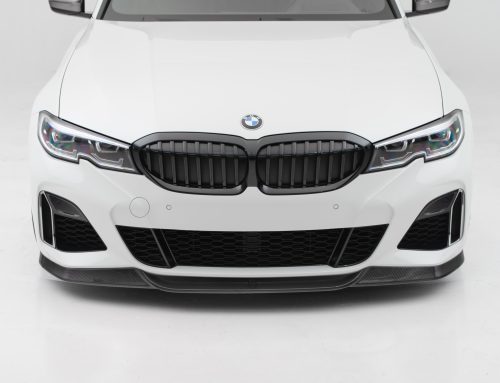Installation
Step 1
Mount relay
Mount the fog lamp relay (lower arrow) in the engine compartment near the battery.
Here, we remove the plastic hood cable shield (two screws, top arrows), then drill a hole in the shield to mount the relay.
Drilling two extra holes let us tie wrap the harness wires to the cover. Mount the relay where you like. Just make sure the power (red) and ground (brown) wires in the relay harness can reach the battery terminals
Step 2
Locate pin 2 on light harness
Route one of the two yellow wires from the relay harness to a headlight connector. Use a small screwdriver or punch to slide the purple plastic terminal retainer (arrow) out of the electrical connector.
Insert a yellow harness wire into the pin 2 location of each headlight connector (This will supply power to the fog light through the main OEM connector). Push the purple plastic retainer back in place to lock all the wires in the connector, then repeat this step at the other headlight.
Service Tip: You may need to remove a small green rubber plug from the pin 2 location to make room for the new wire. This can be easily removed with a small at-blade screwdriver or pick.

Step 3
Run the blue wire through the rewall to the interior Locate one of the two available grommets in the rewall to route the blue harness wire into the cabin.
Run the blue wire through the rubber grommet in the rewall, located just above the brake booster.
Remove the Torx® screws securing the underdash panel, then drop it down.
Reach up and pull the blue wire through the grommet into the interior, beneath the dash.

Step 4
Remove the light switch from the dashboard
- Press in on the light switch knob and while turning it clockwise until it stops.
- Then pull the switch straight out of the dash.
- This car already has a Euro headlight switch with fog light setting. If your car has a stock switch with no fog light setting, you’ll need to order one (ES8602).

Step 5
Route the blue wire to the switch
Squeeze the retainer clips on the wire harness connector and pull the plastic connector out of the switch.
Route the blue wire up from the underdash area, and pull it through the light switch opening in the dashboard.
Secure the wire beneath the dash with zip ties. Route and secure the wire so it cannot get caught in pedal mechanisms or the steering column.
Plug the blue wire into the #8 terminal in the harness connector (arrow).

Step 6
Connect the blue wire to the switch
Push the blue wire into terminal 8 of the headlight switch connector. When it is fully inserted, it should click and lock in place. Tug the wire a few times to be sure it won’t pull out.

Step 7
Optional – Disable DRLs
- If you want to disable your daytime running lights (DRLs), locate the TFL tab on the back of the light switch. Carefully break this tab o with needle nose pliers or a similar tool.
- Install a Euro headlight switch with a fog light switch setting (ES8602).
- Push the switch straight into the dash opening until it clicks in place.

Step 8
Connect the relay to power
- Remove the battery cover.
- Bolt the red wire with the inline fuse to the positive battery terminal.
- Place the fuse holder where you can reach it later, should you need to replace the fuse.
- Secure the wire to the main battery cable with tie wraps.

Step 8
Connect the relay to ground
Connect the brown (ground) wire from the relay harness to the negative battery terminal.
Test t the battery cover. Make sure the cover does not pinch any wires when installed.

Interested in purchasing?
Fog Light Wiring Harness







